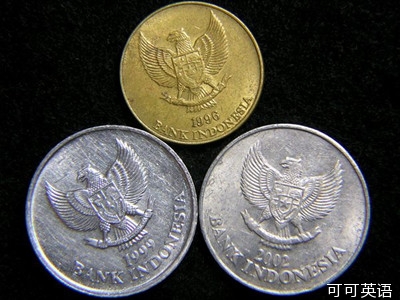財(cái)經(jīng)商業(yè)
Indonesia's banks
印度尼西亞銀行
The good times end
黃金時(shí)代的終結(jié)
Banks' solvency is not in question. Profitability is another matter
銀行償付不是問(wèn)題 獲利才是問(wèn)題
IN THE late 1990s Indonesia's banking sector collapsed after the rupiah lost about 85% of its value against the dollar, leading to a spate of loan defaults by borrowers unable to service their foreign debts.
90年代末盧比匯率暴跌貨幣損失85%價(jià)值,這造成了大量大量貸款拖欠者無(wú)力償還外債。
The rupiah's recent decline—the currency has dropped by 14% against the dollar since the start of the year—and a big current-account deficit have revived uncomfortable memories of that period.
盧比的匯率下跌以及大量的財(cái)政赤字使得那些不好的記憶重現(xiàn)。
Indonesia's economy is now growing at its slowest pace in almost three years.
今年是印度尼西亞這三年來(lái)經(jīng)濟(jì)增長(zhǎng)最為緩慢的一年。
 In real terms GDP expanded at an annual rate of 5.8% in the second quarter, down from a recent high of 6.8%.
In real terms GDP expanded at an annual rate of 5.8% in the second quarter, down from a recent high of 6.8%.
在第二季度中實(shí)際GDP增長(zhǎng)率僅為5.8%,較之前的6.8%有所回落。
Since May Bank Indonesia, the central bank, has lifted its main interest rate by 125 basis points to 7%, the highest since June 2009, in an effort to reverse the rupiah's slide.
為了阻止盧比的下跌,五月份以來(lái),印度尼西亞的中央銀行將主要利率將之前的基點(diǎn)125上調(diào)了7%。這是自2009年6月以來(lái)的最高值。
When the currency was stable it made sense for firms to borrow in dollars even if their revenues were in rupiah, says Ivan Tan of Standard & Poor's, a ratings agency.
標(biāo)準(zhǔn)普爾的Ivan Tan稱(chēng)當(dāng)貨幣穩(wěn)定時(shí)公司更傾向于用美元貸款,即使他們所收入的是盧比。
Slower growth, currency depreciation and higher interest rates will “start to stretch companies' ability to repay their debts.
緩慢的經(jīng)濟(jì)增速,貨幣貶值以及高利率限制了企業(yè)還貸能力。
Firms with dollar revenues, which are naturally hedged against exchange-rate risk, may not be as safe as they once were.
而那些收入美元的公司能在一定程度上避免匯率波動(dòng)所帶來(lái)的風(fēng)險(xiǎn),但這也不是絕對(duì)的。
Many of Indonesia's biggest exporters are in the natural-resources sector, selling things like palm oil, rubber or minerals.
印度尼西亞的大型出口企業(yè)多出口自然資源比如棕櫚油橡膠或者金屬。
International prices for such commodities have tumbled recently as growth has slowed in China and other large importing countries.
受中國(guó)及其他主要進(jìn)口國(guó)經(jīng)濟(jì)增速放慢的影響,這些商品的國(guó)際價(jià)格最近都有所下跌。
This is not the 1990s again, however.
這已經(jīng)不是90年代了。
Indonesia's banks have high capital ratios—an average of 16.9% in May for the country's commercial lenders.
但是印度尼西亞有著很高的資本比。—在5月份,商業(yè)貸款人平均占16.9%。
Credit growth has raced along at an annual rate of about 20% in recent years, but this has been financed mostly by deposits rather than flightier wholesale borrowing. Non-performing loans are equivalent to only 2% of total lending.
最近幾年信貸年增長(zhǎng)率急速增加到20%左右。但這一增長(zhǎng)主要由存款拉動(dòng)而不是流動(dòng)性批發(fā)貸款。
Corporate balance-sheets are widely accepted to be stronger than they were during the Asian crisis.
較亞洲金融危機(jī)期間,法人財(cái)務(wù)狀況表已被更廣泛地接受。
Stricter regulation means that lenders are better at managing their own exposure to exchange-rate risk, too.
嚴(yán)格地管理意味著借貸人會(huì)更好地應(yīng)對(duì)報(bào)表與匯率波動(dòng)之間的關(guān)系。
Fitch, another ratings agency, notes that banks' net open positions average only 2% of their capital, well within the 20% maximum permitted at the end of each business day.
惠譽(yù)稱(chēng)銀行的凈末平倉(cāng)合約平均只占其資產(chǎn)的2%,而每個(gè)營(yíng)業(yè)日最多允許20%
Even so, change is coming to the industry.
即使是這樣,這也給工業(yè)帶來(lái)了改變。
Indonesia's banks have been among the world's most profitable in recent years.
最近幾年,印度尼西亞銀行已經(jīng)成為了世界上最賺錢(qián)的銀行。
As the economy slows, and banks put aside more provisions for bad loans, the years of effortlessly high returns are ending.
隨著經(jīng)濟(jì)增速放緩,銀行需要應(yīng)對(duì)更多的不良貸款。銀行的暴利時(shí)代已經(jīng)終結(jié)。
 In real terms GDP expanded at an annual rate of 5.8% in the second quarter, down from a recent high of 6.8%.
In real terms GDP expanded at an annual rate of 5.8% in the second quarter, down from a recent high of 6.8%.
 In real terms GDP expanded at an annual rate of 5.8% in the second quarter, down from a recent high of 6.8%.
In real terms GDP expanded at an annual rate of 5.8% in the second quarter, down from a recent high of 6.8%.